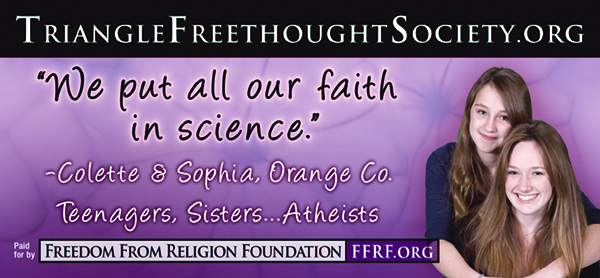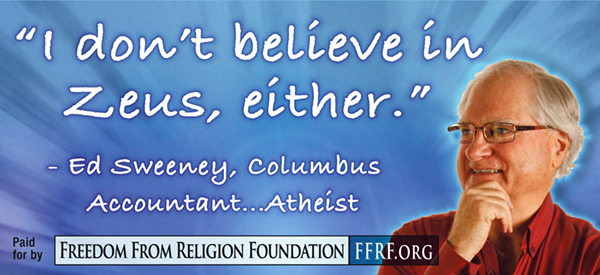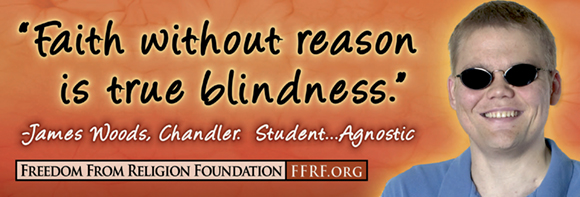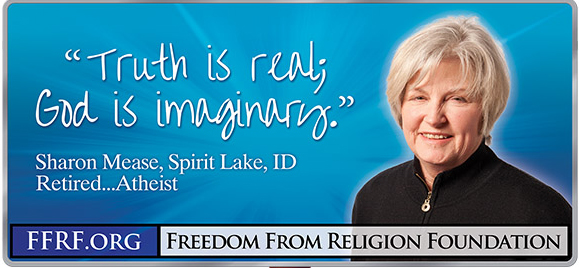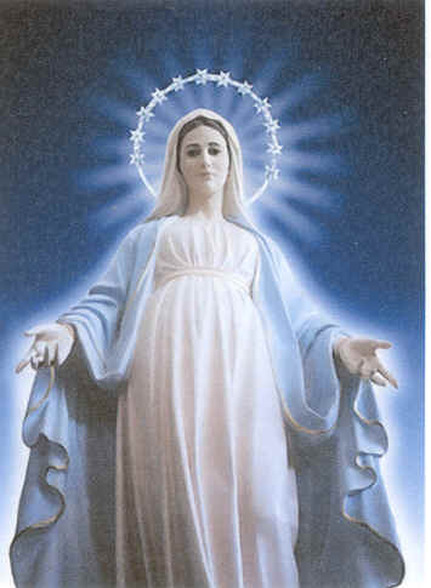How is it that
many of the following bands on this list- who are anything but religious- seem more Catholic in their imagination than many Christians who likewise select religious band names? To put it another way, why is it that artists who seem least inclined to religion can come up with names that are remarkably theological, while those with far more of a taste for it come up with impotent names like "One Thousand Foot Crutch" or "Blessed Union of Souls"? It is an interesting question and it demands a response. In part, I think the answer has something to do with the overall genericization of the Christian message, the sacramental gutting, if you will, of the deeply rooted theological language of the historical Faith. In place of this language, one receives a far more vague and bland contemporary vocabulary. However, what many of the bands below demonstrate is that while Christians have been spending their time tossing out these traditional concepts, non-believing artists have been recouping them. In fact, many of these musicians not only have chosen band names that are theological, but have done likewise with album titles and songs. But beware- as you will see below, when you are careless with the things of God, you may not be pleased with how they are used by the one who sees it only as a fashionable accessory.
1. Genesis
When the founding band members were attempting to come up with a name for the group, they initially tossed out the name "Gabriel's Angels" (an obvious allusion to the lead singer's name). Ultimately they chose to go in a different direction, but apparently they still wanted a band name with Biblical implications. Thus, they settled on the name "Genesis" because they liked the fact that the name suggested the beginning of something important. And indeed they were right, for they (and a few other bands) were at the forefront of what came to be called 70s "Prog-Rock".
2. Exodus
If you are going to begin a list of theological band names with Genesis, then it is only logical that #2 should be "Exodus". Nothing like the former, founding thrash metal band member Kirk Hammett (now in the Metallica) came across this name when he saw a novel of the same title. Generally associated with the "Exodus" of the Israelites from slavery in Egypt, the word nevertheless carries with it all of the gigantic implications of the Biblical event itself; "a journey", "a departure"; "an escape"; "a mass exit"; the image of two voluminous walls of water making a pathway to freedom. Clearly such a word makes one think of the Hebrew Scriptures, but it also apparently possesses a literary force all its own (as the novel above suggests). This may help explain why a band which has very little in common with religion would choose to give themselves this name, while simultaneously making music for the past thirty years that has very little to do with anything religious.
3. Lamb of God
Initially this band went by the delightful name "Burn the Priest". However, not wanting to be regarded as a Satanic group (I can't imagine why anyone would think that), they changed their name to "Lamb of God". Continuing with the prior Exodus theme, we find here a further reference to the Passover of the Israelites, which included a ritual meal wherein those present would consume the flesh of the lamb, and place it's blood on the "lintels" of their doorposts. This meal, they believed, would preserve and protect them from the so called "Angel of Death" (which I'm pretty sure is another thrash metal band), who was given leave to kill every firstborn of the Egyptians. The only ones who were spared were those shielded by the "blood of the lamb". Moreover, this lamb, according to Christian theology, was a figure and a foreshadowing of the "true Lamb of God", the one who, as St. John the Baptist put it, "takes away the sins of the world."
4. Testament and Ministry

In the thrash (or death) metal scene, if you what to see how dark and sinister a band is you may want to do so by looking at their relationship with Slayer. I call it six-degrees of Slayer, and it is seems appropriate that the closer in "degrees" one gets, the higher the flames and more pungent the sulphur. Once again with the band Testament, we do have a band that is tied to Slayer (one of the lead guitarists ultimately joined); a band who, by the way, really does love to show their street credibility with its proliferation of Pentagrams. Alongside Testament, I have to place the band Ministry, because I always used to confused the two. Back when these bands were in their heyday (you know, when MTV was still playing music), these two were regulars on the "Headbangers' Ball". Ministry's big "mainstream" hit was called Psalm 69 (one of the more depressing Psalms, as you might suspect). I think I found the song catchy, or at least as catchy as a song can be where every word sounds like Scooby-Doo yelling "Roh roh roh roh roh roh", insert riff, repeat, "roh roh roh roh roh roh". However, perhaps I conflated the two because they are in many ways complimentary band names. After all, you cannot have a "ministry" without a message or "testament". But whatever the reason, the names always stood out as powerful names to me, even if they were "only" religious names.
5. Black Sabbath

This band that was originally called Earth, but they soon changed it as a consequence of Ozzy Osbourne's deep appreciation for a horror film of the same title. Black Sabbath really was the beginning of a darker turn for rock'n roll. They managed to take blues music, which generally tends to a have a more whimsical side to it, and make it the blues from hell. Simply listen to the riff from the song the "War Pigs" and tell me that that isn't the "angel of death" dressed up in the cloak of the blues. There are many interesting back stories which explain why their music sounds so dark and unique (one being the fact that Toni Iommi lost part of his index finger to a saw), but for me it begins and ends with Ozzy Osbourne's haunting vocals. Often referred to simply as "Sabbath", they, like the previous bands, sought to borrow another Biblical theme, namely the day that God made for rest. Now while the idea of "rest" might not sound so menacing at first, words do tend to have a power all their own. Of course it could be argued that the only reason the name garnered such appeal is because the band decided to preface it with the word "black" (very creative). Nevertheless, as previously noted, when people refer to the band they seem to feel it is sufficient to simply call them Sabbath. Hence, while the name "Black Sabbath" may provide the band a more sinister veneer, the fans themselves actually prefer the shortened version, which is not sinister at all.
6. Our Lady Peace
Categorized as a "post-grunge/alternative" band, this group began with the name "As If" (clearly they were not yet post-Wayne's World). Soon after forming, they changed their name to "Our Lady Peace", from a poem of the same name written by American poet Mark Van Doren. There is really no other reason behind the name other than the general attractiveness of the title itself. While many non-Catholics may see Marian devotion as odd (and some Catholics as well), oftentimes people who have no "dog in the race" will come along and recognize how beautiful and powerful some of these devotional titles really are (Billy Corgan made a solo album called
Mary, Star of the Sea). This perpetuates the odd phenomena whereby the baptized fail to see the beauty and/or power in their faith, while those who stand on the outside recognize it right away. A further example of this occurred right after Vatican II, when some priests in San Francisco, ready to do away with the old ways, apparently threw way their gilded fiddleback vestments into the garbage bins there in the city. And while they did not see the beauty in those vestments, some members of the Grateful Dead apparently did, for they fished them out and immediately proceeded to make them a part of their musical wardrobe.
7. Judas Priest
As provocative as this name sounds, the name apparently comes from an old expression that seeks to substitute the name "Judas Priest" for "Jesus Christ". In other words, instead of using the name of the Lord disrespectfully, one substitutes this name euphemistically, for such a name cannot be anymore profaned that it already is. Nevertheless, one can all but assume that when this heavy metal outfit was deciding on a band name they weren't really so much concerned with respecting the name of God. And if you are in truth going for a dark despairing angle as a band, you could hardly come up with a better way to describe the project. Few names can match the power (at least in the negative sense) of what those two words mean together. Apart from Satan and Jezebel, what other negative associations could pack more of a verbal punch? Clearly the office of the priesthood is arresting in itself, but then add to that the ultimate betrayal of the office, and there you have before you a recipe for wickedness.
8. The Church

Known primarily for their top 40 hit "Under the Milky Way", this 1980s New Wave band turned "prog-rock", initially set out to call themselves "The Church of Man". However, for the purposes of pithiness, they shortened it to "The Church". The true artist does not censor himself, even when his instincts take him in a direction he might not otherwise go. And thus even while the band found further commercial success more than a little elusive, the name of their band, and the power behind the words themselves (viz. the Church), continue to live in my imagination. Obviously the institution itself brings with it a lot of imagery, but perhaps more than anything else what comes to mind is the achingly beautiful architecture that tends to accompany those words, from the greatest cathedral to the most humble little chapel. However, if you really wanted to stretch concept of Church you might even envision the musicians themselves as the hierarchy, and the people in the audience as ecstatic, spirit-filled followers.
9. The Jesus and Mary Chain
It is unclear precisely where this 1980s alternative band got their name, but the most likely scenario involves was simply from hearing the phrase in connection with…surprise… a religious necklace with an image of Jesus and Mary on it. I must confess when I was younger and first saw this dark brooding band, I immediately assumed that there was something more sinister their choice, and frankly, why shouldn't I, considering it was obvious that they didn't choose it in order to honor God? The reasoning of these bands is, I think, much less intentional that all that. What they are looking for is a title that sounds cool, ironic, mysterious, dark, poetic, or all of the above. And once again it never ceases to amaze me that even if these bands can be criticized and condemned for using God's name(s) for commercial reasons alone, there is still the fascinating mystery as to why these "non-relgious" bands want religious names. Conversely, the equally fascinating question is why so called religious bands are generally terrible at doing the same. Is it because God gave most of his talent to individuals that wound up misusing it? Or is it because we can only appreciate religious things when they are re-introduced by people that are not religious at all? In other words, if a "religious" band (disclaimer: I hate that term because it usually presumes a very narrow category of what it means to make music with any depth), were to use these names, would they be equally appealing? And if not, why? Some may say that the key ingredient here is "cynicism", and that may be true, but if the names were not meaningful or powerful in and of themselves, then aforementioned cynicism, would be like a joke that no one understood. Consequently, even if the intent of these bands is pure sarcasm, the sarcasm would lack any punch, if they weren't really rebelling against anything that had its own.
10. Creed
(Speaking of punch, the above photo is a rendering of the events at the Council of Nicea, wherein Jolly Old St. Nicklaus purportedly punched the heretic Arius). Anyhow, the band
Creed got their start in the early 90s, though they only became successful in the mid to late part of the decade. In many ways the band Creed represents "grunge" in the final throes of death. There had already been countless imitators of the Eddie Vedder vocal stylings, and for obvious reasons some lumped Creed into this category. However, there was one thing that this band had that set it apart from all those other bands (as well as the rest on this list). Lead singer, Scott Stapp, like many in the grunge scene complained of suffering, but he also seemed to believe that there might be some point to this struggle (God forbid). Thus, while the musical style may not have been wholly original, the fact that the music went beyond self-pity and despair was somewhat novel. While not expressly a religious band they were certainly willing to at least explore those themes in a way that many young people appreciated deeply. As a consequence, many Christian fans sought to idealize them in a fashion that was perhaps disproportionate with their original intention. Couple that with the fact that their name has religious implications, and then you have the perfect storm (Creed comes from the Greek word "Credo" which means "I believe"). Thus, for those interested in music exploring more than pain and posturing, this band seemed like the perfect remedy. Unfortunately, as this list suggests, there is such a dearth of those who actually do this
well it is understandable that they would be elevated to heights of Christian rock royalty. Nevertheless, this lionization may be part of the problem in the first place. When heavy metal bands use religious themes in titles for their band, songs, albums, they do it as an ironic edifice. There is no further deep thinking involved. They pick it because they think it sounds cool. The danger for so-called Christian artists is that they fail to see their faith from an outsider's perspective; that is, they fail to see it with a poet's eye. They're stuck in a kind of formulaic and anemic repetition, which is to say that they imitate the musical fashions of the day and slap over it predictable and maudlin lyrics. When in doubt, subtlety is the poet's friend. But if they really want to explore interesting and deeply theological themes, they have to come at it from the perspective of one who is in exile, or at least from the perspective of Job. Life is a battle, so when you force unimaginative platitudes into a song, or if you try to make yourself sound tough and sad, it just comes off as disingenuous. The reason that Creed worked while it did was because Stapp was coming from an outsider's perspective struggling to get in. And when you see something from a distance, you really might just see it for the time. Perhaps it is best summed up in this Christian riddle; "I have not come to call the righteous, but the sinner… Tax collectors and prostitutes are entering the kingdom before you…" (Luke 5:32; Matthew 21:31)
11. Nirvana
Nirvana got their name when front man Kurt Cobain decided that in spite of the fact that his original demo was called "fecal matter", he did not want his band name to be crass or ugly. To the contrary, he wanted it sound beautiful and utterly sublime. Thus, he and fellow bandmates settled on the term "Nirvana". Used mostly in Buddhism (though some Hindus use it as well) to refer to a blissful state that exists beyond the realm of the senses, it is not quite what Christians regard as heaven. In Buddhism the goal is not to be in communion with God in a perfect and intimate bond for all of eternity, but rather to extinguish the flame of desire, annihilate the self (there is no "I" in I), and thus fall back into that unconscious, undisturbed, and utterly blissful state of non-being. Why must we go to the trouble of extinguishing
all attachment to self and the world? Because, as Billy Corgan once said; "The world is a vampire..." Just as the band Creed represented angst that was in search of meaning, so conversely Nirvana (and grunge) quite often represented pessimism about the world, coupled with a pessimism about the next life-"I don't want heaven, I just want the light/flame to be permanently extinguished." In the Christian faith, the "light shines in the darkness, but the darkness fails to overcome it. In Buddhism the light
is the darkness; "All in all is all we are… All in all is all we are… All in all is all we are…" In the end I suppose it is more than a little appropriate that while Cobain was trying to come up with a "heavenly" band name, what he settled on was anything but, preferring a pessimistic paradise where "nothing" is literally sacred, and where everything else (which is everything) is evil.
12. Avenged Sevenfold
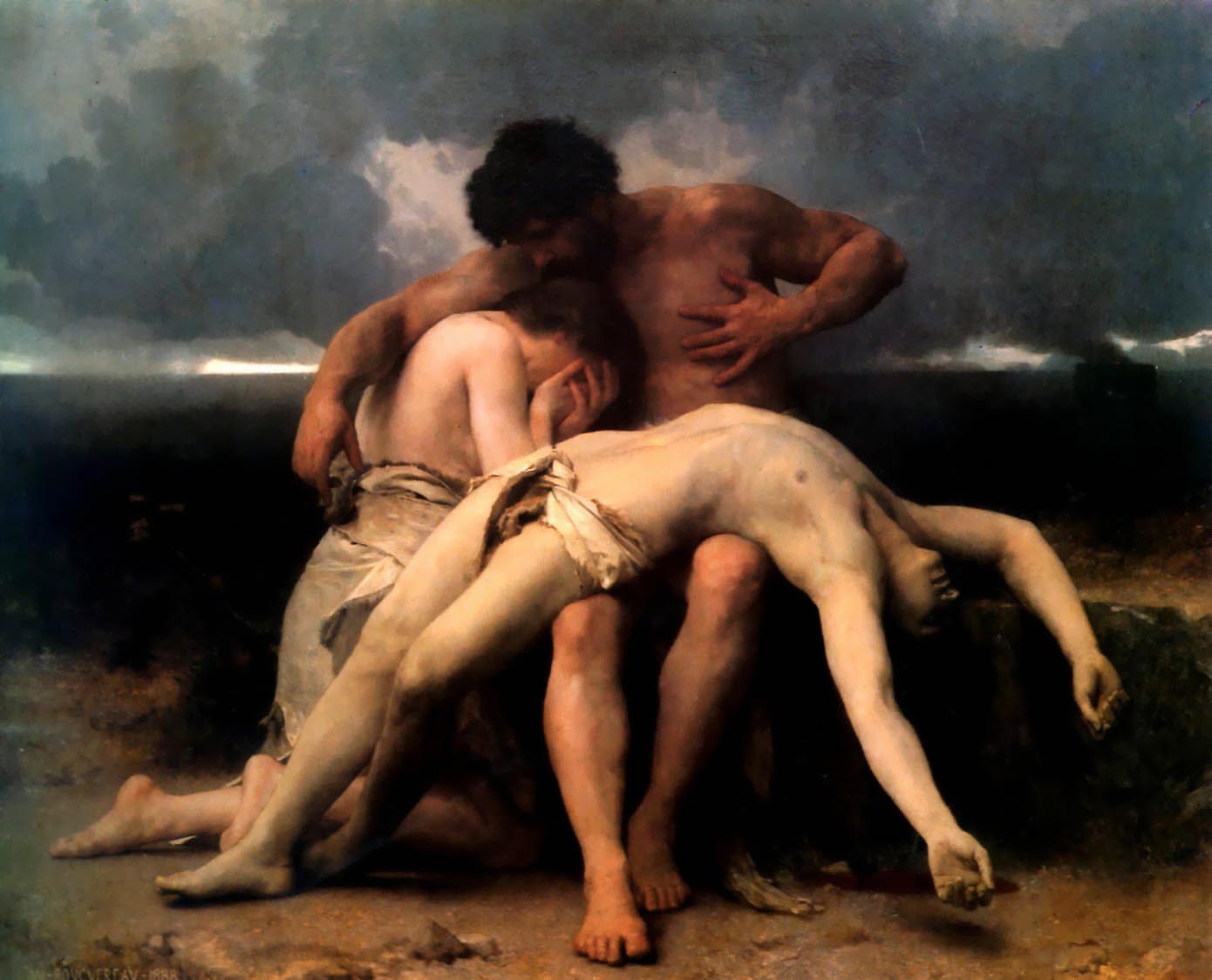
Taken from the story of Cain and Abel, the name of this particular American rock band was selected when founding band members opened the Bible in an attempt to find a provocative title from the Old Testament (sound familiar?). The term "avenged seven-fold" comes from the the punishment that God promises to mete out to anyone who attempts to bring any harm to Cain. Beyond looking for a name that is aesthetically provocative (or one that seems to cast pallor on any religious sensibility), perhaps many of these bands also find something more than a little attractive about the virility and power of God in the Old Testament. The drama and violence of the Old Testament is undeniable. Add to that the spectacle of the various theophanies, and what you have is raw theatre. Thus, in some ways it is not a surprise that they are drawn to these epic stories, who themselves seek to combine virility (at least they used to) with a kind ruthless barbarism. Unfortunately, I fear that they admire the cruelty of barbarism, without trying to understand God's larger program of elevating the Israelites, and by extension man, from that crude state.
13. Sepultura
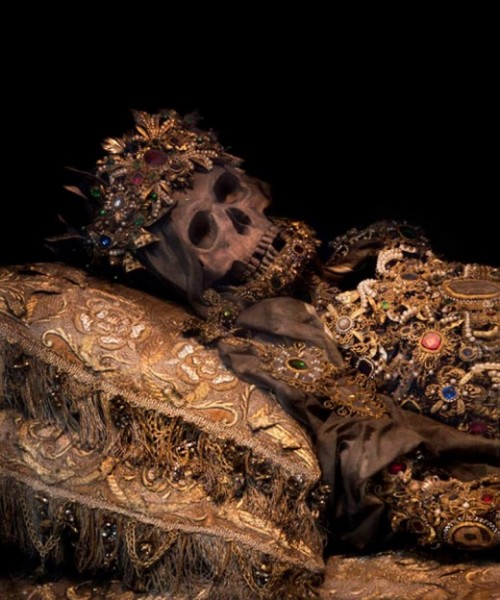
This Brazilian heavy metal band was founded in the 1980s. The name itself is a Portuguese translation of the English word "sepulcher". The word itself simply means grave, tomb, or sarcophagus (which is somewhat amusing because one of the founding members left the band and started another band with that name). However, the word itself was/is generally associated with Jesus' tomb (viz. the Holy Sepulcher). And of course how could you possibly conceive of nihilistic music without also talking about death, death, and more death... coupled with a lead vocalist who sounds a little bit like he is swallowing dirt as he is singing. Ironically, in this case the death that is associated with the original meaning is a hopeful death, a death that actually puts the "pulcher" in sepulcher. It is perhaps one of the strangest truths in all the world that most of the bands who do really have interesting theological names, at best, have nothing to do with religion, or at worst have everything to do with the wrong kind of it. It is also a strange truth that bands who do have every reason to boast good theological names, go with the weakest. Need I mention Stryper (it is a religious acronym and a reference to the "suffering servant" of Isaiah), Blessed Union of Souls, Thousand Foot Crutch, P.O.D., Casting Crowns andThree Days of Grace? I suppose the last two examples are alright, but the others? Meh; they just aren't evocative of anything theologically rich, at least in how they are formulated.
Honorable Mentions: The Sisters of Mercy; Nazareth; Peter, Paul, and Mary; Jars of Clay (this is a reference to St. Paul's assertion that Christians have an immortal treasure which is placed in "jars of clay/earthen vessels"); Sodom; Faith No More; Mercyful Fate, and Sacred Rite.












